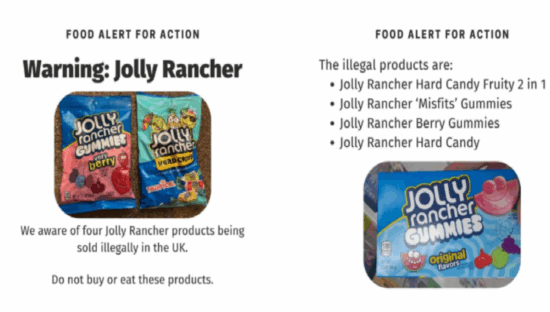Consumers have been advised not to buy some products from The Hershey Company as they do not meet legal market requirements in the United Kingdom.
Affected Jolly Rancher products contain mineral oil, which isn’t allowed in food in the UK and may pose a food safety risk if consumed regularly over a sustained period of time.
The Food Standards Agency (FSA) and Food Standards Scotland (FSS) said although the levels people are exposed to are likely to be low, they may present a risk to health because of Mineral Oil Aromatic Hydrocarbons (MOAH) and Mineral Oil Saturated Hydrocarbons (MOSH).
Consumption of the sweets is of toxicological concern, especially in younger age groups and where consumers have a lot of the products or eat them regularly. MOAH can cause damage to DNA and has the potential to increase the risk of cancer. It is a genotoxic carcinogen, so no exposure is without risk to human health.
The Hershey Company removed non-compliant and unsafe confectionery from UK markets in 2024 and decided not to supply the region going forward. However, other businesses continue to import their products for the UK market. This prompted the FSA to ask enforcing authorities in the UK to remove products.
Businesses selling these items in the UK are advised to immediately stop sales, undertake product withdrawals and where there have been retail sales, conduct recalls. Importers have been asked to discontinue import and distribution of products.
All pack sizes, dates, and best before dates of Jolly Rancher hard candy, Misfits gummies, Hard candy fruity 2 in 1, and Berry Gummies are affected.
Dubai-chocolate warning
The FSA is also raising awareness about potential issues with Dubai Chocolate.
Most Dubai-style chocolate in UK shops is safe but some of it may not be intended for sale in the region and could lack a full ingredients list or allergen labeling. Some products have been found to contain additives and colors which aren’t allowed in the UK. The FSA is sampling products to determine the scale of the issue.
Other reports of non-compliance include chemical contamination, undeclared allergens, Salmonella contamination and the presence of toxins produced by molds.
Products are often imported from countries such as Turkey and the United Arab Emirates and are sold across settings ranging from online and national retailers to small convenience stores.
Products made to UK standards should have labels in English containing information such as a list of ingredients, with allergens emphasized; weight in grams; a best before or use by date; and the name and address of the associated UK or EU business or importer.
Simon Williams, chief executive of Anaphylaxis UK, said: “It is very concerning to hear that a product that has become so popular with consumers has managed to make it on to UK shelves without correct allergen labeling. Ingredient labels are vital for consumers to make informed, safe choices about what they purchase, and incorrect or absent information can have devastating consequences.”
There have been nine Rapid Alert System for Food and Feed (RASFF) reports in the past six months. Reasons include undeclared sesame and aflatoxins in Dubai chocolate.
Professor Robin May, chief scientific advisor to the FSA, said: “If you are looking to buy Dubai-style chocolate, we advise sticking with trusted retailers, like the ones you’d use for your weekly shop, as products are more likely to be made for UK consumers and so are safe to eat.
“As it’s difficult for consumers to tell the difference between products made for the UK and those that aren’t, if you have a food allergy or intolerance, we advise that you do not buy the product unless you’re certain it’s intended for sale here. If you have concerns about chocolate that you see on sale, don’t buy it and instead report it to your local authority.”
(To sign up for a free subscription to Food Safety News, click here)



